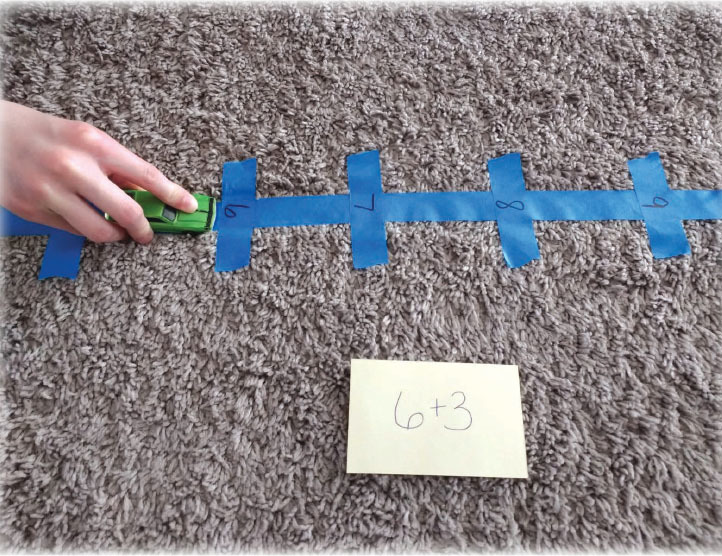Memorizing math facts won’t be a bore anymore with these “math-tastic” activities using supplies you may already have.
Race Cars

Create a number line on your floor using painter’s tape and a marker. As you show addition or subtraction flashcards one at a time, have your child race a car on the number line using the first number shown on the flashcard as the starting line and the answer as the finish line. For example, if the flashcard says 6+3, the starting line is 6. The car races 3 spaces and ends on its finish line, the number 9. Repeat the same handful of races until memorized.
Choose a Fact of the Day
Repetition can help with memorization, and doing one at a time may be less overwhelming. Each day, choose a new math problem and display it in a visible location. Anyone can randomly say that math problem throughout the day to be answered by someone else. At the end of the week, practice all of the previous math problems.
Play Numbers, Numbers, Numbers
Instead of Rock, Paper, Scissors, players show however many fingers they choose. Whoever adds, subtracts, or multiplies (whatever is decided ahead of time) the fingers from each player together first wins a point. For example, if one person shows two fingers and the other person shows three fingers, the first to say six if multiplying, five if adding, or one if subtracting gets a point.
Play Cards
Remove the Jacks, Queens, Kings, and Aces from a regular deck of cards for these games.
Two players each flip a card face up at the same time. Whoever adds, subtracts, or multiplies (whatever is decided ahead of time) the numbers on the cards first gets to keep both the cards. Play continues until someone runs out of cards.
Players each flip two cards at a time face up, then they add, subtract, or multiply (whatever is decided ahead of time) their own cards. Whoever has the highest number answer gets to keep all of the faceup cards. If it is a tie, each player flips two more cards over and tries again.
Scramble Pebbles
Write numbers in the bottom of an empty egg carton. Put two pebbles in the egg carton, close the lid, and shake. Then add, subtract, or multiply the two numbers that the pebbles land on.
Roll Dice
Shake a pebble in a numbered egg carton (or randomly call out a number 1-12). Roll five dice. Then add, subtract, and multiply the numbers on the dice as many ways as possible to equal the chosen number. Each die can only be used once in a math problem, but you can use the same die multiple times with different problems. For example, if the number is 6, and you roll a 1, 2, 3, 4, and 5, two example problems include 2 + 4 and 2 × 3. More advanced problems could include 5 × 2 – 4.
Roll two dice. Whoever can add, subtract, or multiply the two numbers first gets a point. Play continues until someone reaches ten points.
Compete with Flashcards
Show flashcards one at a time. Whoever answers the problem correctly first, keeps the card. The one with the most flashcards at the end wins.
Make Your Own Flashcards
Let kids decorate their own flashcards for them to practice. How creative will they be?
Catch a Ball
Toss a ball as you call out a math problem. The person catching the ball answers the math problem as quickly as possible before calling out a new math problem and tossing the ball to someone else.
Swat Answers

Write answers to math problems you are practicing on separate index cards. As you show problems one at a time, have your child swat the correct answer with a (preferably clean) fly swatter.
Go on a Math Hunt
Cut math worksheets into sections, write clues on the back, and hide them. As math sections are finished, your child uses the clues to find the next section until all have been completed.
Hide math problems and answers in different spots. Then, each child races around to find and match them together.
Play Memory
Write math problems and their answers individually on index cards. Place the index cards face down. Take turns flipping over two cards each turn to find matches. If they match, you keep the cards. If they aren’t a match, you flip them over again. Play continues until there are no more available cards.
Repetition is key to memorizing facts. Your kids may enjoy these activities so much that repeating them over and over again may not be a problem and soon they will have all of their math problems memorized.
Copyright 2019, The Old Schoolhouse®. Used with permission. All rights reserved by the Author. Originally appeared in The Old Schoolhouse® Magazine, the trade publication for homeschool moms.
Enjoy this post? Read on, and sign up for our homeschool newsletter!
Math Matters in Your Homeschool